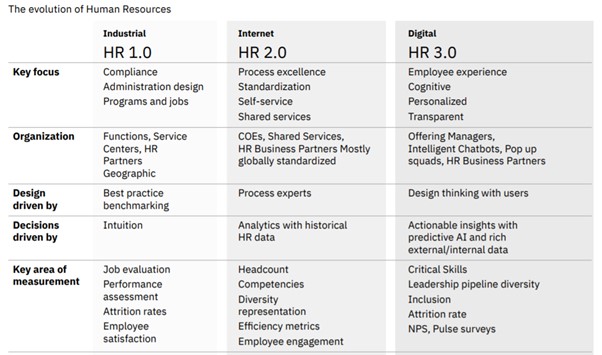
Only 10% of HR executives are living in the HR 3.0 era

In a state of “near-constant disruption,” the human resources profession is evolving into what is called the HR 3.0 era. But not everyone is evolving at the same pace.
New research from the IBM Institute for Business Value and industry analyst Josh Bersin showed how seven in 10 HR executives believe the function is “ripe for reinvention”. However, just a fraction of HR professionals is said to have entered this new era.
Read more: How has COVID-19 impacted your company’s digital transformation?
“Historically, HR departments have largely been administrative. They take responsibility for hiring, pay, compliance, and basic job design,” Bersin said in his analysis.
“Today, however, as we recover from the pandemic, companies need HR to focus on the employee experience and drive reskilling, cultural transformation, and an evolution to new models of work.”
In their survey of more than 1,500 HR executives from over a dozen industries, analysts found HR departments fall into three categories.
“Traditional HR 1.0 departments focus on compliance, administration, and highly efficient service delivery,” Bersin said.
“HR 2.0 teams move toward integrated centres of excellence, and focus on training and empowering business partners to deliver solutions at the point of need.
“HR 3.0, which only 10% of companies have achieved, turns HR into an agile consulting organisation; one that not only delivers efficient services but also practices design thinking to push innovative solutions, cognitive tools, and transparency into the organisation.”
Redesigning EX and people leadership
At the heart of HR 3.0 is the redesigning of employee experience – such that the concept is no longer confined to the experiences of the individual within the organisation.
IBM and Bersin have recalibrated the idea of EX into a “deeply personalised” and “experience-centric” engagement with employees. It’s an entire spectrum of interaction, mindful of the life circumstances of employees, both inside the organisation and beyond.
The work-from-home revolution is one of the many factors that catalysed this. “[Today] it’s insufficient to think of employee experience as limited to the employee,” the analysts said.
“In an era where the line between office and home continues to blur, the employee’s family experiences the company, too, and therefore should be considered when designing and enhancing any employee experience.” The study calls on people leaders to design experiences intentionally.
“Today’s workforce expects meaningful employee experiences that are highly personalised, responsive to their needs and constantly improved,” the analysts said.

Credit: IBM Institute for Business Value